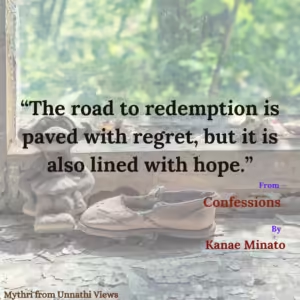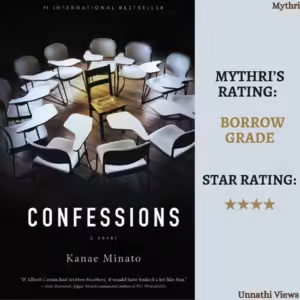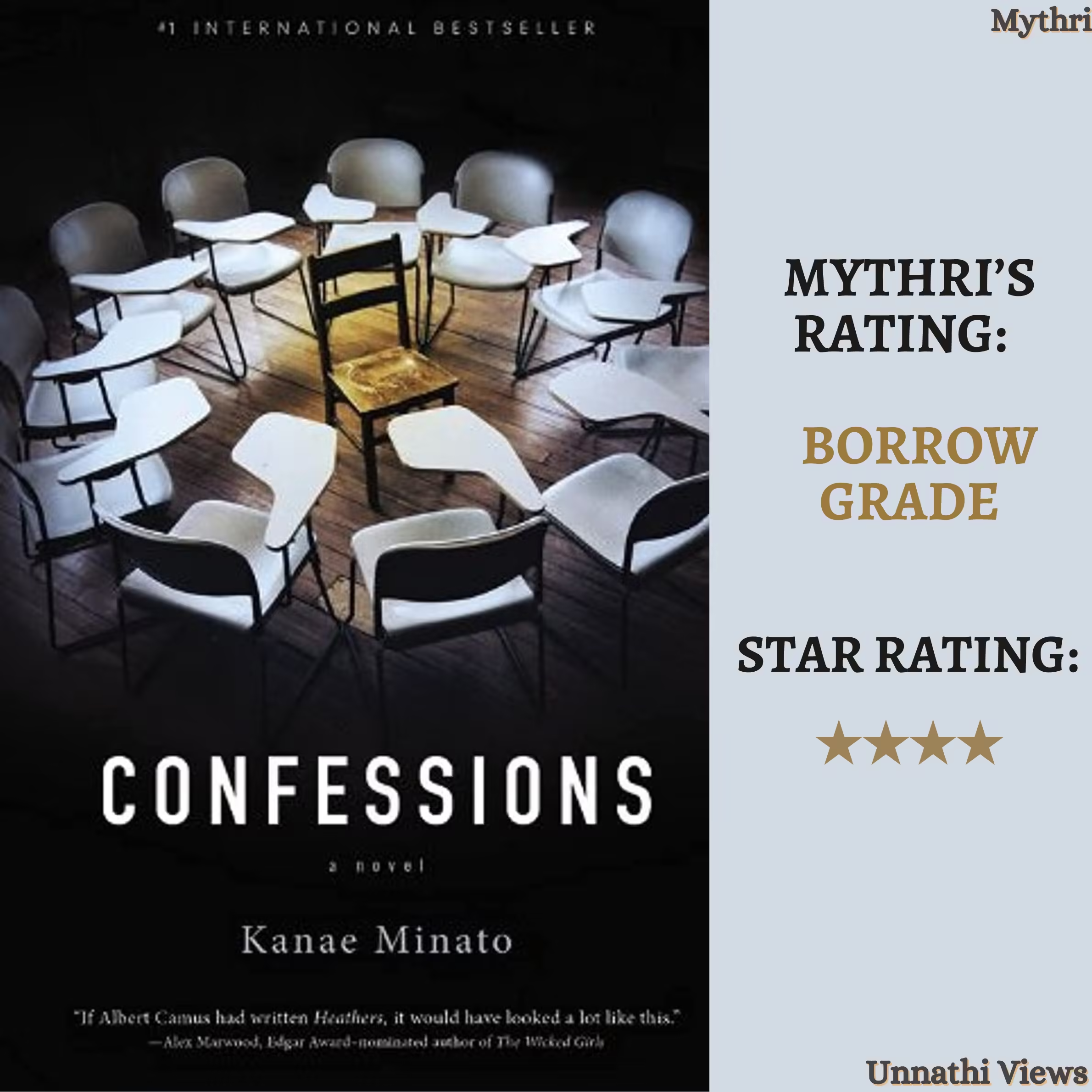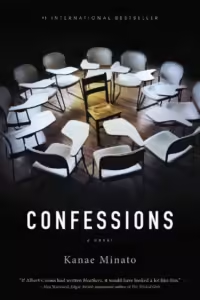Namo Namaha, bibliophiles!
“Today, I’m going to tell you a story.” – Yuko Moriguchi, Confessions
This seemingly simple statement, spoken by a middle school teacher during her resignation speech, marks the beginning of a chilling tale that forever changed my perspective on justice and revenge! After being thoroughly impressed by Malice, I found myself drawn to stories that challenge our understanding of truth and morality. I discovered this gem through a recommendation from booktuber RachaelMarie_BT (as she was known at the time), and it proved to be a story that shattered my preconceptions about morality and human nature!
Synopsis
In a middle school classroom in Japan, teacher Yuko Moriguchi delivers her resignation speech. What begins as a seemingly routine farewell transforms into something far more sinister as she reveals the devastating truth about her four-year-old daughter’s death. Through multiple perspectives, we witness how one lecture sets in motion a chain of events that will challenge everything we think we know about truth and retribution!
The Book at a Glance

Affiliate Link (India)
- Author: Kanae Minato
- Translator: Stephen Snyder
- Genre: Japanese Literature, Psychological Thriller, Translated Fiction
- Pages: 234
- Original Title: 告白 (Kokuhaku)
- Original Publication: 2008
- Publication Year: 2014 (English Translation)
- Publisher: Mulholland Books
⚠️ Trigger Warnings: Child death, violence, psychological manipulation, bullying, suicide themes.
The Art of Revenge
The first chapter of Confessions delivered such an intense psychological punch that I found myself sitting in stunned silence, hand pressed against my mouth. In my years of reading psychological thrillers, I’ve rarely encountered an opening chapter that grabbed me with such force. Minato masterfully crafts a narrative that begins with this explosive revelation and then methodically unravels its consequences through multiple viewpoints.
One passage particularly struck me to my core. Minato writes:
This observation cuts to the heart of the story’s central theme – the cycle of victimization and the choices we make when conventional justice fails us. Through Yuko‘s actions, we see there’s always another choice, though whether it’s the right one becomes the moral question that haunts every page of this book.
Plot and Pacing
While the brilliant opening sets an exceptionally high bar, the subsequent chapters follow a more measured pace. As Minato reminds us through her narrative, “Truth is a slippery thing, always changing shape depending on who is telling it.” This shifting perspective keeps readers engaged, even as the story’s pace varies between explosive revelations and quieter moments of reflection.
Characters and Perspectives
The story’s strength lies in its exploration of complex characters and their layered motivations. Minato astutely observes that “Sometimes, the things we hide from others are the same things we hide from ourselves” – a truth that becomes increasingly evident as each character’s perspective peels back new layers of deception and self-delusion.
However, certain character behaviors tested my suspension of disbelief. The portrayal of a father remaining oblivious to significant family developments, despite being present and supposedly caring, felt particularly jarring. Similarly, the complete silence of an entire class about major incidents seemed to push the boundaries of plausibility.
Deeper Implications
 Beyond its thriller elements, Confessions forces us to confront uncomfortable questions about:
Beyond its thriller elements, Confessions forces us to confront uncomfortable questions about:
- The effectiveness of juvenile justice systems
- The depths of parental love and grief
- The complexity of pre-teen psychology
- The thin line between justice and revenge
The novel opened my eyes to a darker reality. Minato suggests that “The past cannot be changed, but it can be understood and accepted.” Yet, through Yuko‘s actions, we’re forced to question whether understanding and acceptance are always enough when faced with devastating loss.
Review, Recommendation, and Rating
 Mythri’s Rating: Borrow Grade – This book is definitely a one-time must read.
Mythri’s Rating: Borrow Grade – This book is definitely a one-time must read.
(Click the link to learn more about my personal rating system!)
Star Rating: ⭐⭐⭐⭐
While Confessions may not demand multiple readings, its impact lingers long after the final page. The opening and closing chapters are masterfully crafted, making the book worth experiencing despite some middle sections feeling less compelling.
For readers who enjoy psychological thrillers like Out by Natsuo Kirino or The Devotion of Suspect X by Keigo Higashino, this book offers a uniquely disturbing exploration of moral boundaries and retribution.
Final Thoughts
Confessions is like a precision blade wrapped in silk – deceptively smooth until it cuts deep. It’s not a book I’ll likely revisit, but it has permanently altered my perception of how darkness can lurk in the most unexpected places. The story serves as a powerful reminder that justice and morality rarely exist in absolutes, particularly when viewed through the lens of maternal grief.
Have you explored any Japanese psychological thrillers? I’d love to hear your thoughts on Confessions or recommendations for similar books. Drop your comments below, and if you enjoy diving into thought-provoking international literature, consider subscribing to my blog for more reviews. You can also connect with me on Twitter, Facebook, and Goodreads where I regularly share my reading adventures and engage in bookish discussions.
Stay blessed and keep reading. Om Shanti 🙏
Error: Contact form not found.





